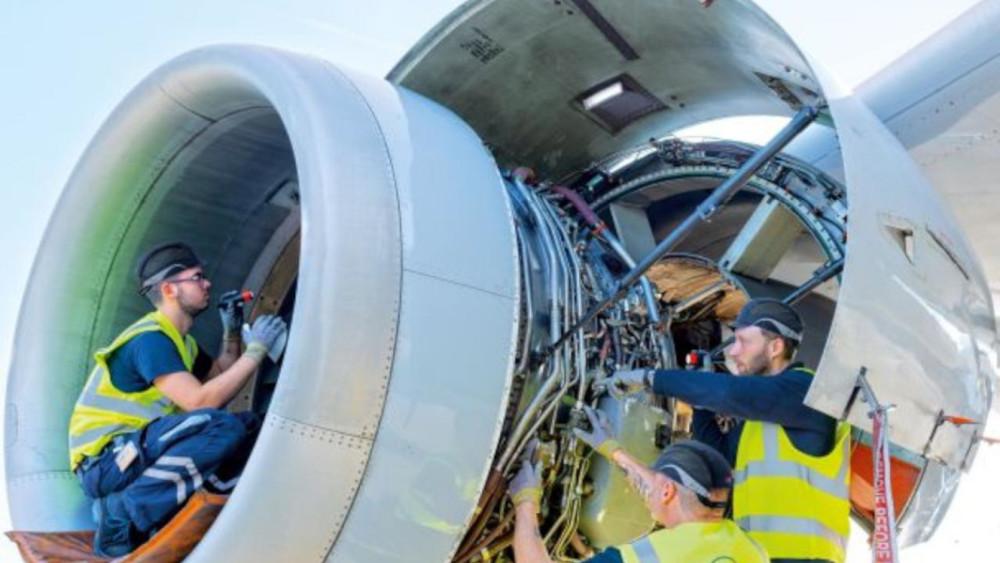
It’s not just parts and aerospace metals that MROs are seeing escalating in price. Labor costs are accelerating as well. The Teamsters Union recently agreed with United Airlines to raise mechanics’ wages. Top pay is now $70 per hour, which works out to more than $145,000 per year. The union signed an even more favorable deal with UPS in Oct. 2022.
Both agreements are in contrast to the first two years of the pandemic, when cash-poor airlines, excess mechanics and inflation saw real wages decline.
Chris Moore, who represents the Teamsters’ Airline Division, says market forces are driving mechanic wages up across the board in the U.S. Even the recent new pay levels are up for renegotiation in a year and may go higher. And the airline was eager to get the agreement, Moore says.
The largest carriers typically pay the best for experienced workers, but their pay puts pressure on smaller airlines and shops. “United wants mechanics to expand its operations, they are snapping them up. Wages are coming up across the industry,” Moore stresses.
The Teamsters exec thinks higher pay is at least a partial answer to the current and looming shortage of aircraft mechanics. “You can’t offer them work from home, like other industries. Money is a factor in attracting and retaining people.”
Another possible answer to the shortage is sending more MRO work abroad. When Oliver Wyman estimated the U.S. would be short 43,000 to 48,000 mechanics in 2027, it assumed that only the same portion of U.S. MRO would be sent to foreign repair stations as is now sent. Is that inevitable?
“The market does not want to outsource more maintenance offshore or nearshore; airlines want local maintenance,” says Derek Constanza, an Oliver Wyman partner. “Of course if they can’t figure out how to do it locally, it will have to go offshore.”
Widebodies are the most likely candidates for foreign overhauls, in Constanza’s view, because they require so much labor and hangar space. And Constanza thinks U.S. shops make higher profits margins on turning over many narrowbodies. But narrowbodies might increasingly go to Central America, if the labor-cost difference becomes too wide.
Mechanics unions definitely do not want more work to go offshore. Sometimes labor agreements prohibit or limit the degree of possible offshoring, sometimes they do not. For example, United’s most recent agreement with the Teamsters adds five heavy maintenance lines in-house to increase job security.
And the unions are backing another effort in Congress to at least discourage outsourcing to foreign shops. H.R.7321, which was introduced March 27, would require airlines to provide certain reports on maintenance and impose other requirements.
“Our concern is that foreign repair stations could start popping up without the proper FAA oversight, drug abatement and background check requirements that make the U.S. system so robust,” explains Moore.
“Wherever maintenance is performed on U.S.-registered aircraft and regardless of by whom, all work is performed according to the standards set out in 14 CFR part 43,” insists Christian Klein, executive vice president of the Aeronautical Repair Station Association (ARSA). “. . . this legislation is a solution in search of a problem.”
If the U.S. will soon be short of mechanics, and competent mechanics exist abroad, Wyman’s Constanza would like to find some path through the immigration system to bring these willing recruits to the U.S. That would seem to meet at least the safety concerns of the unions
One point in which labor, ARSA and consultants agree is that much more needs to be done to ease the training and recruitment of new U.S. mechanics. Many entities are at least working on this problem.
For example, The Teamsters have used FAA funds to run an eight-week Aviation Basics program in Houston, which familiarizes young people with aviation careers, including maintenance. And the union is collaborating with United on its Calibrate program, an in-house apprenticeship for non-licensed Teamsters to acquire new skills and become FAA-licensed Airframe and Powerplant Technicians at the airline.
So, higher pay, more foreign work, importing mechanics from abroad, or smarter recruitment? MRO is facing real labor challenges, but it has several options for meeting these challenges.





